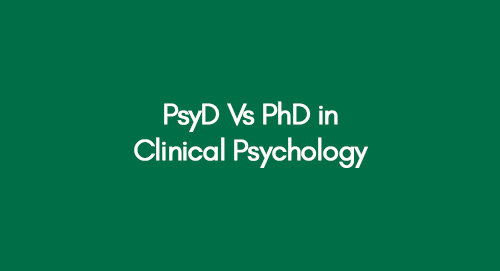
Unveiling the Truth: Can Universities Detect ChatGPT? AI Usage in Academia
June 13, 2023
Dissertation Gantt Chart | Guide & Templates
June 14, 2023When pursuing a career in clinical psychology, individuals often come across two prominent doctoral degrees: PsyD (Doctor of Psychology) and PhD (Doctor of Philosophy). While both degrees lead to a doctoral-level qualification, they have distinct differences in terms of training, focus, and career paths. The selection of dissertation topic in both PsyD and PhD is a crucial step. Please find below a link to free dissertation topics.
Get 3+ Free Dissertation Topics within 24 Hours
In this article, we will explore the key differences and similarities between PsyD and PhD in Clinical Psychology, helping you make an informed decision about which path aligns better with your goals.
PsyD (Doctor of Psychology)
PsyD is a professional doctorate that emphasizes clinical practice and applied psychology. It is designed to prepare students for direct clinical work, focusing on assessment, diagnosis, and therapy. Some of the essential characteristics of the PsyD degree include have been discussed below;
Clinical Emphasis
PsyD programs prioritize practical training and hands-on experience in therapeutic techniques and interventions. Students often complete extensive clinical practicum or internship hours to develop their clinical skills.
Research Component
While PsyD programs do include research training, the emphasis is typically on applied research rather than theoretical or experimental research. The research conducted is often focused on clinical practice and outcome evaluation.
Career Focus
PsyD graduates primarily pursue careers as licensed clinical psychologists, working in clinical settings such as private practice, hospitals, counseling centers, or community mental health agencies. They are trained to provide direct therapy and psychological assessments to clients.
PhD (Doctor of Philosophy) in Clinical Psychology
PhD in Clinical Psychology is a research-focused degree that emphasizes the integration of clinical practice and scientific research. Please find below an important source of topics in clinical psychology.
Find Our Quality Clinical Psychology Dissertation Topics
It prepares students for a wide range of careers, including research, academia, and clinical practice. Here are som of the the key components of a PhD program;
Research Emphasis
PhD programs place a strong emphasis on research skills development. Students are expected to engage in original research, contribute to the scientific knowledge base, and publish their findings in peer-reviewed journals.
Clinical Training
While PhD programs also include clinical training, the focus is on integrating research and evidence-based practice. Students gain a solid foundation in clinical assessment, intervention, and psychotherapy techniques, but with more emphasis on theoretical frameworks and research-backed interventions.
Career Opportunities
PhD graduates have diverse career options. They can pursue academic careers as professors or researchers, work in applied research settings, or provide clinical services in various settings. Additionally, they may also be involved in program development, policy-making, or clinical supervision.
Similarities between PsyD and PhD in Clinical Psychology
Licensure
Both PsyD and PhD graduates are eligible for licensure as clinical psychologists, allowing them to provide mental health services and practice independently.
Rigorous Training
Both programs require rigorous coursework, clinical practicum hours, and supervised internship experiences to ensure comprehensive training.
Ethical Standards
Graduates from both programs are expected to adhere to the same ethical standards and codes of conduct set by professional psychology organizations.
Conclusion
While PsyD and PhD in Clinical Psychology share similarities in terms of licensure, rigorous training, and ethical standards, they differ significantly in their training focus and career paths. The PsyD degree emphasizes clinical practice and applied psychology, preparing graduates for direct client care, whereas the PhD degree emphasizes research, theory, and the integration of science and practice. Understanding these differences can help you make an informed decision based on your career goals and interests in the field of clinical psychology.
Below are some more useful sources of information;
Review Our Quality Psychology Dissertation Examples
How to Write a Dissertation Proposal?
How to Craft an Exceptional Concept Paper? | A Comprehensive Guide
Get 3+ Free Dissertation Topics within 24 hours?


























